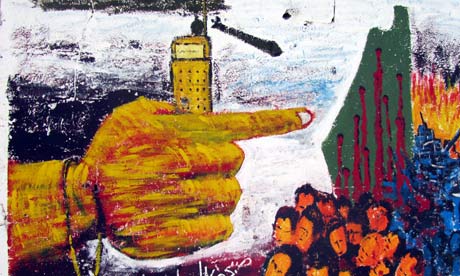Gaza campaign includes posters, murals, radio broadcasts and religious speeches, and runs alongside amnesty for informants

Hamas has launched a campaign warning Palestinians in Gaza against collaborating with Israel following the execution of two alleged informants in April.
Posters and murals have appeared across Gaza City, graphically depicting the consequences of providing information to Israeli intelligence. Some include images of nooses, while others warn that "your people's blood will be on your hands".
The Campaign Against Collaborating with the Enemy, which also includes speeches by religious clerics, radio programmes and advertisements and newspaper articles, is running alongside an amnesty for informants which ends on 10 July.
"We are educating people with the aim of reducing or eliminating collaboration," said Abu Abdullah Lafi, who is in charge of the campaign for the de facto Hamas government's interior ministry.
The problem, he said, was not widespread, but Israel was making intensive efforts to recruit informants. "The blockade has created a new scale of people who are unemployed. The IDF [Israeli military] is calling them, offering dollars in exchange for small amounts of information. First they ask who are your friends, neighbours, who is in Fatah or Hamas."
Eventually they demand information that will allow them to carry out assassinations, he said. Lafi declined to give details on how many people had turned themselves in, saying the information was "very confidential".
At the end of the amnesty, Hamas will arrest those it suspects of being informants. "They will go through the normal legal procedures," Lafi said. "Not all collaborators will be executed. Whatever the courts decide we will abide by. The death penalty is not automatic."
The execution of two collaborators in April drew condemnation by human rights organisations. They were the first executions since Hamas won elections in January 2006, and were carried out without the required authorisation of the Palestinian president, Mahmoud Abbas.
According to Hamas, the extent of their collaboration was particularly egregious. "They were working with the army, they were in their tanks, holding their guns," said Lafi.
The Palestinian Centre for Human Rights challenges the legal process by which the pair were convicted and sentenced, saying it was constitutionally flawed and there was no proper appeals process.
"Those accused of collaboration must be guaranteed a fair trial and their rights in law," said Hamdi Shaqqura of the PCHR. He added: "We are very much opposed to the death penalty even for those who have committed severe crimes. The death penalty is a gross violation of human rights."
According to Palestinians, Israel is increasingly attempting to recruit as informants people whose close relatives need to leave Gaza for medical treatment in Israel. "They target the wife, the husband, the parents, the children. They don't miss any chance to recruit patients and their relatives," said Shaqqura.
Hamas is unsympathetic to such dilemmas, saying many who are poor or in need of treatment refuse to co-operate. "It's not a good enough excuse to say I need to feed my children. It's the duty of people to resist," said Lafi.
The PCHR is alarmed at Hamas suggestions that NGO personnel have been involved in informing. "There have been some attempts to defame and distort the image of civil society," said Shaqqura, who points to the "increasing penetration of security forces in every aspect of society".
The families of collaborators, often ostracised by their communities, are reluctant to speak publicly. Hamas investigated the families of the executed informants, said Lafi. "They are with the resistance. They made public statements renouncing their sons."
Israeli intelligence is worried about the Hamas campaign, he said. "We have information that officials are calling collaborators here, telling them not to hand themselves in."
Mark Regev, spokesman for the Israeli government, denied that Palestinians needing medical treatment in Israel were required to act as informants. "Everyone in jail in Gaza is accused of collaboration," he said. "It's Hamas's way of settling scores and dealing with opponents."
During Israel's three-week war on Gaza in 2008-09, imprisoned informants escaped when the main jail was bombed. According to PCHR, at least 17 were killed in summary executions.
"We blame the government for the lack of action against the people who committed these crimes," said Shaqqura.
